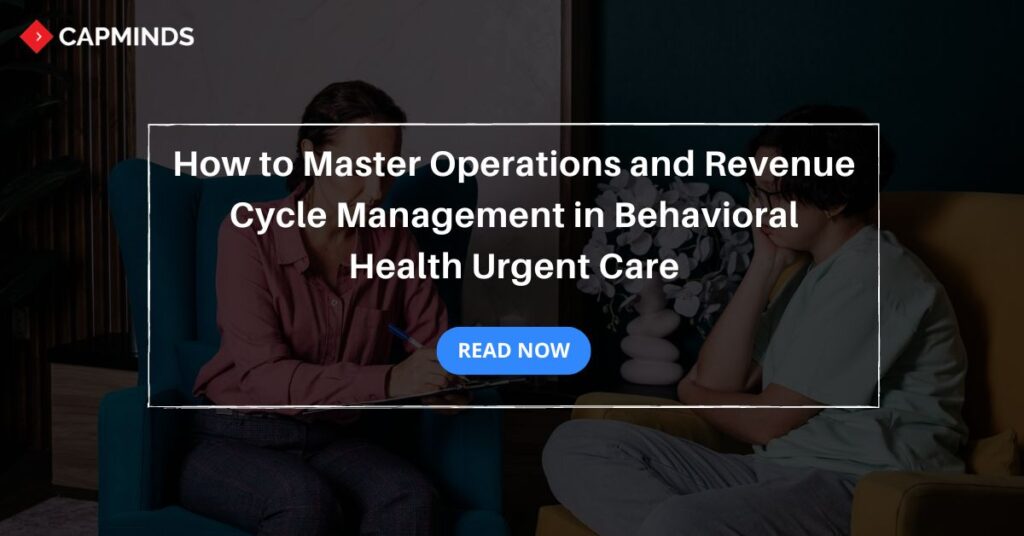How to Master Operations and Revenue Cycle Management in Behavioral Health Urgent Care
Behavioral Health illness is rapidly rising in the United States. Stats revealed that over 57.8 Million U.S adults were affected by mental illness. Which means more than 1 out of 5 U.S. adults. This increasing number has raised the necessity of a new type of care – Behavioral Health Urgent Care.
These facilities are built to address behavioral health patients instantly to avoid emergencies. Now, Everybody is recognizing the importance of behavioral health urgent care. So, optimization of behavioral health operations and revenue cycle has become essential.
In this blog post, you’ll learn how to optimize behavioral health urgent care operations and revenue cycle for betterment.
What is Behavioral Health Urgent Care?
Behavioral Health Urgent Care is a type of care that comes under the behavioral health specialty.
It has a range of services which includes mental health assessments, substance abuse treatments, referrals, intense anxiety, and more. BH Urgent Care mainly addresses urgent needs with quick access to care, often within the same or the next day.
- Same or next-day evaluation
- Psychopharmacology and addiction medication evaluations within 72 hours of initial assessment
- All other treatment and follow-up appointments within 14 calendar days
- Immediate crisis intervention and stabilization services
- Coordination with ongoing care providers for comprehensive support
Strategies to Optimize Behavioral Health Urgent Care Operation
Optimizing BH Urgent Care Operation is important. So, providers can spend time on patient care instead of other administration tasks.
1. Streamlined Initial Patient Intake Process and Triage
The Initial Patient intake process is complex and fast-paced. It needs to be streamlined. Use digital tools like online forms and automated triage systems to minimize wait times. This workflow allows clinicians to quickly access patient needs and direct them to appropriate care.
Also, consider using EHR systems to collect all the necessary information from patients in this initial stage. So, that clinicians can make more informed decisions.
Related: How to Boost Your Practice Financial Health with Revenue Cycle Management Solution
2. Integrated Care Approach
The integrated care approach involved integrating mental health and physical health services to provide holistic treatment for patients. Behavioral health urgent care centers can benefit from collaboration between:
- Primary care providers
- Psychiatrists
- Other specialists.
This method of approach reduces the risk of overlooked conditions.
And also helps to improve patient overcomes. Integrated models result in better-coordinated treatment plans. Patients will easily have access to comprehensive care under one roof.
3. Use of Telehealth for Immediate Consultations
Telehealth offers the BH urgent care providers a tool for providing immediate consultations. This especially benefits patients in rural, remote, or underserved populations. Offering virtual visits means clinics can increase accessibility and reduce the need for in-person visits during urgent situations.
Telehealth significantly reduces wait times and allows providers to deliver mental health care timely. Integrating telehealth into urgent care services ensures patients can access the care they need without delays, enhancing overall satisfaction.
4. Collaboration with Community Resources
Partnering up with the local community resource is critical when thinking about how to continue the care process after the urgent care center. Several strategies can enable behavioral health centers to build a safety net for patients; these include;
- Partnering with housing agencies
- Addiction services
- Support groups.
It also assists in the early identification of those patients who need other forms of follow-up besides medical treatment in addition to proper social support. Clinics use crisis centers within that area so that clients can continue to be supported and thus avoid making emergencies in the future.
5. Personalized Care for Patients
Personalized care is one of the keys to delivering care within behavioral health urgent care since all the clients are unique. This means that the treatment plans must be anchored from the patient’s history, choice, and existing ailments. For instance, a patient’s information from previous visits helps the providers to provide this kind of intervention.
This type of individualized attention increases patients’ involvement and increases their compliance with treatment instructions leading to improved patient satisfaction and therefore better care quality.
6 Key Steps to Optimize Revenue Cycle Management For Behavioral Health Urgent Care
Here is the 6-step process to optimize revenue cycle management for BH urgent care.
1. Patient Registration and Insurance Verification
The RCM in BH Urgent Care starts with patient registration and insurance verification.
And this process needs to be accurately done. During this stage of RCM, collecting patient demographics and insurance details is vital to avoid claim denials later.
It ensures that the patient’s coverage is active and aligns with the services offered. Many practices implement automated tools for real-time eligibility checks to save time and errors. A solid verification process minimized rework.
2. Accurate Documentation and Coding
Documentation and coding accuracy plays a major role in RCM. it is what ensures the providers getting properly reimbursement. BH Urgent Care often deals with complex mental health diagnoses, making precise coding essential. Make sure to stick with the latest CPT codes and ICD-10 codes. It will ensure practices are billing correctly for all services rendered.
Train staff members regularly on documentation and coding updates. This is necessary to prevent errors that could lead to claim denials or underpayment. Proper coding also helps to avoid legal risks associated with overcoming or under-coding.
3. Timely Claim Submission and Tracking
The timely submission of claims and tracking of the same is crucial in RCM, especially for cash flows. There should be integration of electronic claim submission by the behavioral health urgent care centers to avoid more instances of errors as well as enhance the efficiency in processing the claims.
Every claim should then be tracked proactively to note any possible delay or hitch as soon as possible. It eliminates the chances of missing some claims and also minimizes the chance of facing cash flow problems. Individual or centralized systems for claim tracking will improve operational capacity and minimize the delay between service provision and payment.
4. Efficient Denial Management and Appeals
Denials can certainly have a damaging impact on revenues which makes denial management an important part of RCM strategy. Behavioral health urgent care needs to come up with a systematic way of identifying and evaluating the denials.
It is necessary to identify the most frequent reasons for denial and to address them through special training or procedures’ optimization. It is therefore important that the appeals processes are timely and efficient to reverse any denial and get back revenues. Application of automation tools helps in detecting specific denial trends hence helping the practices deal with them before these become common.
5. Revenue Cycle Analytics and Reporting
The use of data is central in making proper decisions towards improving RCM. BH Urgent Care should incorporate a higher level of revenue cycle analytics and reporting techniques that would reveal performance gaps, tracking of KPIs, and monitoring of revenue status.
This way, the leadership gets to have a clear view of which aspects may require enhancement, be it claims processing duration, denial rate, or patients’ payment behaviors. Using these analytics, practices can find specific areas of inefficiencies and losses, and increase the financial performance of the organization.
6. Patient Financial Communication and Payment Collection
To avoid payment delays there should always be proper communication with the patients on their obligations to meet the medical bills. BH Urgent Care should adopt a strategic model for managing patient finances and communicate the same, especially in explaining
- Copayments
- Deductibles
- Out-of-pocket expenses before service delivery.
It is advisable to allow installment payments or make payments through the Internet to get higher collection rates. Also, follow-ups on outstanding balances from the hospital help to remind patients to pay their bills thereby making payment collection a priority thus enhancing cash flow and patient satisfaction.
Related: How Modern Tech Can Help Manage Your Revenue Cycle
Common Challenges Associated with Behavioral Health Urgent Care and How to Overcome Them
During the process, challenges may arise. Navigating the challenges is what ensures the successful optimization of behavioral health urgent care practice.
1. Limited Access to Specialized Care
Behavioral Health Urgent Care often lacks immediate access to specialized care. This may lead to gaps in treatment for complex behavioral health cases.
Solution: Implement telehealth, this would help to bridge the gap. It allows urgent care providers to consult with specialists remotely without being required to visit facilities. Also, ensure partnering with specialized care centers. This can ensure timely referrals and support.
2. Stigma Around Seeking Urgent Behavioral Health Care
Some of the patients may avoid urgent care due to the stigma associated with seeking help for behavioral health issues.
Solution: Conduct community outreach programs and patient education campaigns. This will normalize urgent behavioral health care. Additionally, this will reduce the stigma and encourage individuals to seek timely help when needed.
3. Coordination Between Urgent Care and Ongoing Treatment Providers
Poor coordination between urgent care providers and ongoing treatment teams may occur. This leads to fragmented care and duplication of efforts.
Solution: Utilize an integrated EHR system to resolve this problem. It helps to ensure that all providers have access to the same patient information. This way will create an easier path for better communication and continuity of care across different treatment settings.
4. Managing Crisis Situations Effectively
Urgent care settings may struggle with managing acute behavioral health crises which leads to ineffective or delayed interventions.
Solution: Training staff in crisis intervention techniques and establishing clear. Establish well-defined protocols for handling emergencies. This can improve response times and outcomes which ensures patients receive appropriate care promptly.
CapMinds Revenue Cycle Management Solution
Effective revenue cycle management is essential to improve healthcare practices’ financial health.
To avoid the drawbacks, minimize claim denials, and improve your revenue cycle management, an expert must be put into use in your practice.
At CapMinds, we are bringing a comprehensive solution to make your billing and coding experience better. Our medical billing team expedites your entire billing process. Utilizing our Revenue Cycle Management Solution, your healthcare practice benefits from:
- 24/7 Support: Always available for your queries.
- Dedicated Client Manager: Personalized service for your practice.
- Efficiency and Accuracy: Streamlined billing, fewer claim denials.
- Financial Optimization: Maximize revenue, and correct underpayments efficiently.
- Enhanced Cash Flow: Timely collections, and improved financial management.
- Compliance and Security: Adhere to industry standards always.
We optimize your charges, submit your claims, on-time collection, reduce accounts receivables, identify underpayments, and increase your practice’s net collections, thereby better clinical and service expansion.
We also have a dedicated client manager who will be exclusively assigned to you. And the team will be available around the clock to assist with your queries.
“Reach out to CapMinds to make your medical billing process easier and more effective”




